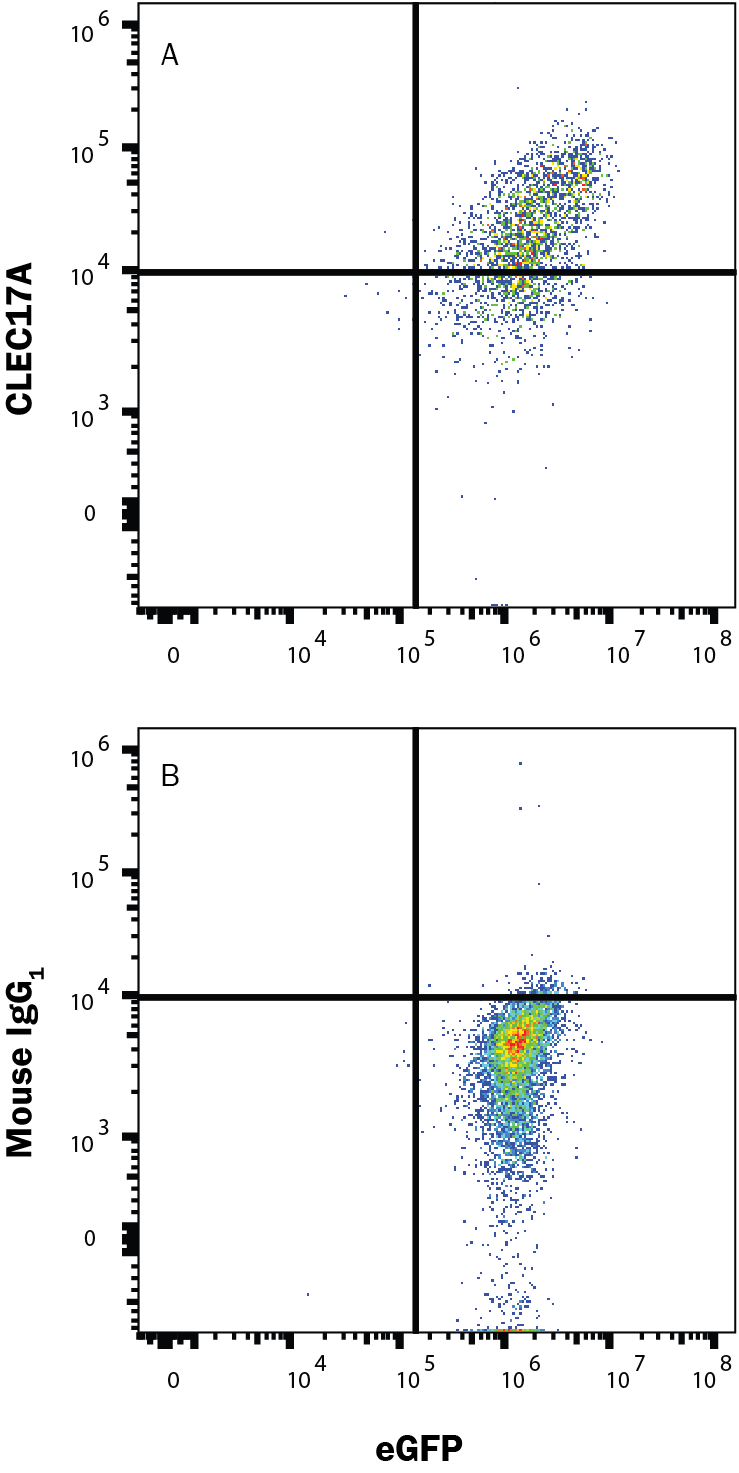Human CLEC17A Antibody Summary
Lys194-Cys378
Accession # Q6ZS10
Applications
Please Note: Optimal dilutions should be determined by each laboratory for each application. General Protocols are available in the Technical Information section on our website.
Scientific Data
 View Larger
View Larger
Detection of CLEC17A in HEK293 cells by Flow Cytometry. HEK293 cells transfected with Human CLEC17A and eGFP (A) vs irrelevant cells (B) were stained with eGFP and Mouse Anti-Human CLEC17A Monoclonal Antibody (Catalog # MAB101471) followed by Allophycocyanin-conjugated Anti-Mouse IgG Secondary Antibody (Catalog # F0101B). View our protocol for Staining Membrane-associated Proteins.
Reconstitution Calculator
Preparation and Storage
- 12 months from date of receipt, -20 to -70 °C as supplied.
- 1 month, 2 to 8 °C under sterile conditions after reconstitution.
- 6 months, -20 to -70 °C under sterile conditions after reconstitution.
Background: CLEC17A
C-type lectin domain family 17, member A (CLEC17A), also known as Prolectin, is type II transmembrane protein that is expressed mainly on dividing B cells found in the germinal centers of secondary lymphoid organs, including lymph nodes, tonsils, stomach, intestine, appendix and spleen (1, 2). CLEC17A binds preferentially to epithelial rather than to mesenchymal cells, and it behaves as a cell adhesion molecule for epithelial cells (2). It has high specificity towards mannose and was found to form disulfide-linked oligomers (1, 3). Human CLEC17A is synthesized as a 378 amino acid (aa) protein that includes a 172 aa cytoplasmic domain, a 21 aa transmembrane segment, and a 185 aa extracellular domain (ECD). Within the ECD, human CLEC17A shares 84% aa sequence identity with canine CLEC17A. C-type lectins are Ca2+-depending sugar-binding proteins that are involved in several immune-related and other physiological functions. Presently, 17 groups within the C-type lectin superfamily have been recognized (4), with more C-type lectins being constantly discovered based on the presence of a conserved 115-130 amino acid domain along their sequences - the C-type carbohydrate recognition domain (CRD). However, for most of the recently identified C-type lectins, their interactions with carbohydrates, intracellular functions and molecular mechanisms still remain unclear (3).
- Graham, S.A. et al. (2009) J. Biol. Chem. 284:18537.
- Breiman, A. et al. (2016) Oncotarget 7:14064.
- Koh, G. et al. (2011) BMC Bioinformatics 12:S5.
- Zelensky, A.N. et al. (2005) FEBS Journal 272:6179.
Product Datasheets
FAQs
No product specific FAQs exist for this product, however you may
View all Antibody FAQsReviews for Human CLEC17A Antibody
There are currently no reviews for this product. Be the first to review Human CLEC17A Antibody and earn rewards!
Have you used Human CLEC17A Antibody?
Submit a review and receive an Amazon gift card.
$25/€18/£15/$25CAN/¥75 Yuan/¥2500 Yen for a review with an image
$10/€7/£6/$10 CAD/¥70 Yuan/¥1110 Yen for a review without an image
